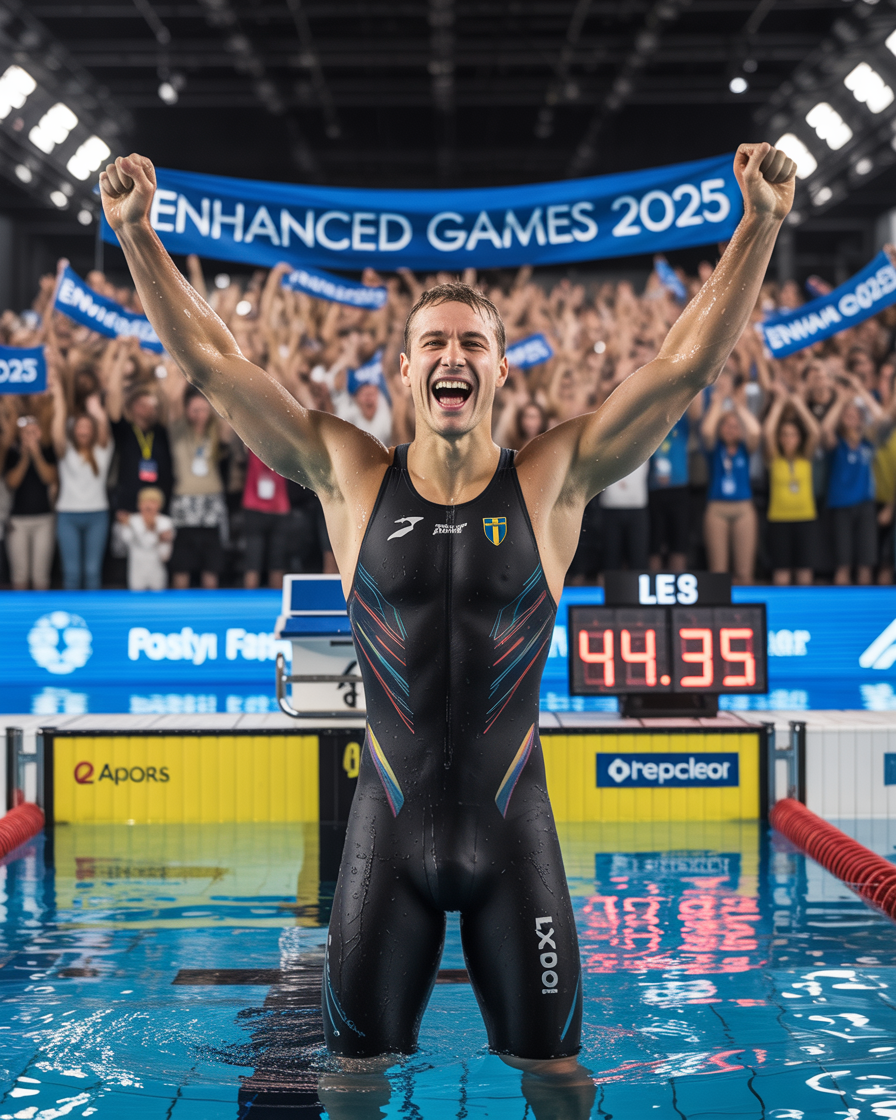The 2025 Enhanced Games have reignited a global debate on the ethics of performance enhancement in sport after a swimmer shattered a longstanding world record while openly using performance-enhancing substances. This milestone has divided public opinion and raised critical questions about the future of elite athletic competition.
What Are the Enhanced Games?
Launched in 2024, the Enhanced Games were founded as an alternative to traditional Olympic-style competitions, explicitly allowing the use of performance-enhancing drugs (PEDs) under supervised medical protocols.
Key principles include:
- Athlete autonomy over their bodies
- A commitment to medical safety and transparency
- Showcasing the limits of human potential without restrictions on enhancements
Critics call it “doping by design”, while proponents view it as a progressive step toward scientific athletic performance.
The Record-Breaking Moment
During the 2025 Enhanced Games swimming finals in Melbourne, Australia, Lars Pettersson, a 26-year-old Swedish swimmer, completed the 100-meter freestyle in 44.35 seconds, eclipsing the long-standing world record of 46.91 seconds.
Pettersson openly disclosed his use of anabolic agents and oxygen-enhancing compounds, both permitted under Enhanced Games rules but prohibited by organizations like the World Anti-Doping Agency (WADA).
After the race, Pettersson stated:
“I’ve trained harder than ever, but I also embraced the tools science offers to push human performance further. I hope this sparks a broader conversation about what sport should be.”
Divided Reactions Across the Sports World
The record has prompted mixed reactions among athletes, scientists, and fans:
✅ Supporters Argue:
- Athletes should have the freedom to choose what they use, provided it is safe and transparent.
- The Enhanced Games serve as a scientific experiment, expanding the boundaries of human performance.
- Medical supervision makes PED use safer than the covert doping that has historically plagued elite sports.
Enhanced Games founder Dr. Aron D’Souza declared:
“This is the future of sport — honest, open, and beyond the hypocrisy of banned substances.”
❌ Critics Warn:
- Normalizing PED use could endanger athletes’ long-term health.
- It undermines the spirit of fair competition based on natural ability and training.
- It may encourage young athletes to seek dangerous substances without proper guidance.
The International Olympic Committee (IOC) issued a statement reaffirming its commitment to drug-free sport and WADA compliance.
The Broader Ethical Debate
The Enhanced Games have reignited long-standing questions in sports ethics:
- Should performance enhancement be regulated or prohibited?
- Can an athlete’s choice to enhance be considered consensual amid competitive pressures?
- Does technology, such as superior gear, differ ethically from pharmaceutical enhancements?
Sports philosopher Dr. Laura Kim argues:
“We’ve long accepted certain performance advantages, like altitude training or biomechanically superior equipment. The Enhanced Games challenge us to reconsider where we draw the line.”
The Role of Technology and Medicine
Advancements in biotechnology and sports medicine have made safe performance enhancement more plausible:
- Gene editing for muscle growth and endurance
- Oxygen-carrying therapeutics to delay fatigue
- Anabolic agents with reduced side effects
At the Enhanced Games, athletes undergo rigorous medical screenings to ensure their health during and after enhancement protocols.
Impact on Traditional Sports
Some experts fear that the Enhanced Games’ popularity may:
- Pressure traditional sports organizations to reconsider anti-doping policies.
- Blur the public’s perception of what constitutes a legitimate world record.
- Create parallel elite sports circuits, fragmenting fan bases.
However, others argue that the Enhanced Games offer a distinct category, much like e-sports or combat sports with differing rule sets.
Fan Engagement and Media Coverage
The record-breaking performance has drawn massive global attention:
- Over 50 million viewers streamed the swimming finals across platforms like YouTube Live and Twitch.
- Hashtags like #EnhancedGames and #PetterssonRecord trended worldwide.
- Merchandise featuring the phrase “Science Wins” sold out within hours.
Supporters highlight the Enhanced Games as a media-savvy, modern sporting spectacle, tapping into a generation increasingly fascinated by biohacking and human augmentation.
What’s Next for the Enhanced Games?
Organizers plan to expand the Enhanced Games in 2026 with additional sports, including:
- Track and field
- Weightlifting
- Cycling
Athletes from over 60 countries have expressed interest in participating, reflecting a growing acceptance — or at least curiosity — about this new frontier in sports.
Conclusion: A Defining Moment for Modern Sport
The 2025 Enhanced Games swimming record represents more than a mere athletic achievement — it symbolizes a fundamental shift in how society views human performance, risk, and technology in sport.
As debate continues, one thing is clear: the boundaries between natural talent, scientific enhancement, and entertainment are more blurred than ever, setting the stage for the future of competitive athletics.
